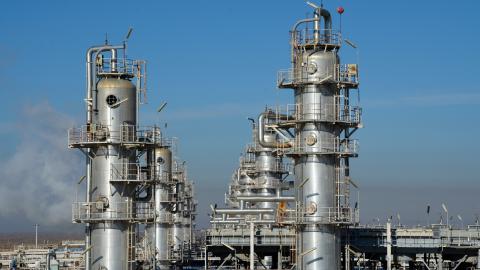Russia’s invasion of Ukraine last year has shaken up global energy markets in ways that are not yet fully understood. Europe’s dependency on Russian oil and gas left countries across the continent scrambling to find suitable alternatives. Liquified natural gas from the Gulf region and the US has played a key role helping Europe to diversify away from Russia for its energy needs.
The Caspian region has also become increasingly important to Europe’s energy security. Within months of the Russian invasion, Baku and the EU signed a landmark agreement that will result in Azerbaijan doubling its gas exports to Europe by 2027. As a consequence of Europe’s move away from Russian energy, Beijing has benefited greatly, with Russian oil and gas originally destined for European markets now available for China, often at a discounted rate.
While Azerbaijan has stepped up to play a major role in Europe’s energy security, just across the Caspian Sea, the Central Asian state of Turkmenistan has also been making moves in the energy sector.
Turkmenistan is home to the world’s fourth-largest natural gas reserves, but the country has made little effort to find ways to export this abundant resource to the outside world. For years, its main export market was Russia. This changed about a decade ago when China became the top destination after the construction of a major pipeline system funded by Beijing. In recent years, a smaller amount of Turkmen gas has been exported to Iran and Uzbekistan. However, there has been an unwillingness by the Turkmen government to seek out new markets for its natural gas and to attract much-needed foreign investment to boost the energy sector.
There are three recent signs that things are slowly starting to change.
First, last week an agreement was made between Turkmenistan and the Iraqi government that could lead to Iraq buying Turkmen gas for the first time ever. Iraq’s oil market is well developed, but the same cannot be said for its natural gas sector. Even though Iraq is thought to have the world’s 12th-largest natural gas reserves, lack of investment in this sector over the years means that there are few opportunities for Baghdad to use this resource.
In fact, Iraq has been dependent on natural gas imports for years, mainly from neighboring Iran. But with international sanctions making it increasingly difficult to continue these imports, Baghdad is hoping to find a suitable alternative with Turkmenistan. The details of the agreement are not publicly known. However, just the symbolism of such an agreement between Baghdad and Ashgabat represents an important new chapter in Turkmenistan’s role in regional energy security.
Second, earlier this month Hungary and Turkmenistan signed a political agreement regarding Turkmen gas being exported to Hungarian markets in the future. At first glance, it might seem odd that Hungary, out of all European countries, signed such a deal. However, on closer examination, it makes perfect sense. In recent years, Hungary has increased its engagement with the Turkic world due to various historical and cultural links. In 2018, it even became an observer in the Organization of Turkic States. Turkmenistan is also an observer and is expected to become a full member of the OTS in the near future. Hungary is also one of the few European countries that continues to import Russian gas despite the war in Ukraine. So there is no doubt Budapest is keen to find a better source of gas.
Finally, there have been positive developments regarding the possible construction of the Trans-Caspian Gas Pipeline connecting the eastern shore of the Caspian to its western shore. This would finally allow much-needed Turkmen gas to enter the existing Southern Gas Corridor pipeline system that connects Azerbaijan to European markets.
With current technology, the only profitable way to move natural gas across the Caspian Sea is by pipeline. Using LNG tankers for such a short distance would be too costly. Fearing market competition, Russia and Iran have pressured regional countries against construction of such a pipeline. In recent years, owing to its growing confidence on the global stage, Azerbaijan has shown more willingness and enthusiasm for the construction of the pipeline. Until recently, Turkmenistan has remained reluctant. In July, the Turkmen Ministry of Foreign Affairs issued a surprising public statement signaling support for “the implementation of the Trans-Caspian pipeline project.” If a trans-Caspian pipeline is realized, it could be a game changer when it comes to Europe’s energy security.
It is unclear what is motivating Ashgabat to make these slight, but encouraging, changes in its global energy policy. One explanation could be that the country’s dire economic situation is the main driver behind the recent push to increase gas exports. It might be as simple as Turkmenistan’s relatively new and young leader, Serdar Berdimuhamedow, finally deciding that a new approach is needed. With global demand for natural gas high, and with such large gas reserves, Turkmenistan could generate a lot of revenue if it enters new export markets. This new approach could also be a consequence of waning Russian influence in the region due to the Ukraine conflict. Leaders in Central Asia are showing greater flexibility and confidence to pursue policies that are more independent of Moscow.
Regardless of the motivation, Turkmenistan and the broader region stand to benefit from a more internationally engaged Ashgabat. Whether it is Turkmen gas for Iraq, more gas for Europe, or the construction of the trans-Caspian pipeline, there will be many benefits for all involved.















